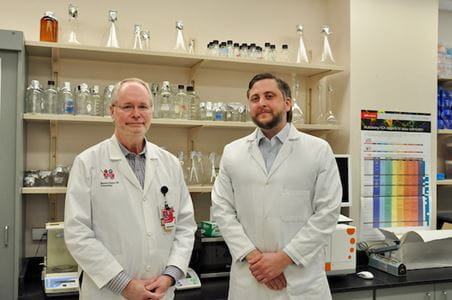Novel bronchodilators and advancements in septic shock diagnosis have potential to revolutionize treatment approaches
INDIANAPOLIS — Indiana University School of Medicine researchers led by Benjamin Gaston, MD, will showcase promising respiratory disease research at the American Thoracic Society (ATS) 2024 International Conference and ATS 2024 Respiratory Innovation Summit (RIS), May 17-22 in San Diego, California.
Gaston is a distinguished leader in pediatric pulmonology, the Billie Lou Wood Professor of Pediatrics at the IU School of Medicine and vice chair for translational research in the school's Department of Pediatrics and Herman B Wells Center for Pediatrics Research. His research lab focuses on new approaches to understanding and treating respiratory diseases.
"We are thrilled for the opportunity to showcase our groundbreaking research at ATS, leveraging this esteemed platform to propel forward our understanding and treatment of respiratory diseases," Gaston said.
The research projects to be featured at ATS 2024 were done in collaboration with two Indianapolis-based biotechnology companies co-founded by IU School of Medicine researchers: Atelerix Life Sciences and Airbase Breathing Company. Gaston is an Atelerix Scientific Advisory Board Member and co-inventor of the company's small molecule drug discovery platform. Gaston and Michael D. Davis, PhD, associate research professor of pediatrics at IU School of Medicine, are co-founders of Airbase Breathing Company.
The upcoming presentations include:
Targeting respiratory viruses: Optate's potential in RSV infection
- RIS Session:
- May 17, 7:30 p.m. PDT
- ATS Session: C71: Asthma Clinical Phenotypes and Therapies
- May 21, 11:30 a.m. - 1:15 p.m. PDT
Co-founded by Gaston and Davis, Airbase Breathing Company was selected to give a poster presentation at RIS on the company and its novel therapy, Optate. This presentation will showcase new data demonstrating the effectiveness of Optate against respiratory syncytial virus (RSV). Optate is under clinical development as a therapy to inhibit viral replication in infections such as RSV, SARS-CoV-2 and human metapneumovirus. The Gaston lab will also present a poster at ATS titled "Airway pH is Low in Asthma: Assessment Using Buffer Inhalation," which will highlight potential uses of Optate to monitor and treat asthma.
Atelerix Life Sciences: Driving innovation in critical care with the world's first respiratory stimulant
- RIS Session: Showcase Three: Critical Care Innovators
- May 18, 11:30 a.m. PDT
Atelerix Life Sciences was selected as a showcase company to present at RIS. As a scientific co-founder of Atelerix, Gaston and his team will highlight ATLX-0199, an active thiol-based compound from the company's platform of novel drugs that reverses drug-induced respiratory depression while preserving pain relief. This compound, licensed to Atelerix Life Sciences under an agreement with Case Western Reserve University, would be the first and only respiratory stimulant that can restore breathing while maintaining needed sedation and pain relief.
Shedding light on septic shock: Photolysis device breakthrough
- ATS Session: A103: Dysregulated Pathways in Sepsis and Lung Injury: Searching For Treatable Traits
- May 19, 2:15-4:15 p.m. PDT
The Gaston lab team has been working on a photolysis device that uses the action of light to group sepsis patients by cause and risk of disease. They will present their poster, "In-vivo and Ex-vivo Analysis of Tissue S-nitrosothiols in Pediatric Sepsis," at ATS.
Unlocking the future of respiratory therapy: Breakthroughs in bronchodilation
- ATS Session: D30: A Narrow Road To Airway Hyperresponsiveness
- May 22, 8:15-10:15 a.m. PDT
- ATS Session: D106: Cutting-Edge Science On Bronchopulmonary Dysplasia
- May 22, 11 a.m. - 1 p.m. PDT
The Gaston lab team has been studying an endogenous airway relaxant molecule that is missing in many patients with asthma. Replacing this molecule by inhalation has been shown to cause bronchodilatation in humans with asthma. Through this work, the team is developing what would be the first new bronchodilator in decades, with research to potentially support new avenues to help treat asthma as well as bronchopulmonary dysplasia in infants. Posters will be featured at two discussion sessions. The first poster, "Inhaled S-nitrosoglutathione (GSNO) Can Serve as an Acute Bronchodilator in Human Asthma, Augmenting the Effect of Albuterol," will clinically demonstrate that GSNO is a bronchodilator in humans. The second poster, "The Potentially Bronchoconstricting Enzyme AKR1A1 Is Expressed in Preterm Human Infants at Risk for Bronchopulmonary Dysplasia," will showcase the new identification of two additional enzymes that break down GSNO in the human pre-term airway. The GSNO product has the potential to provide the first-ever approved treatment for respiratory distress in pre-term infants.




